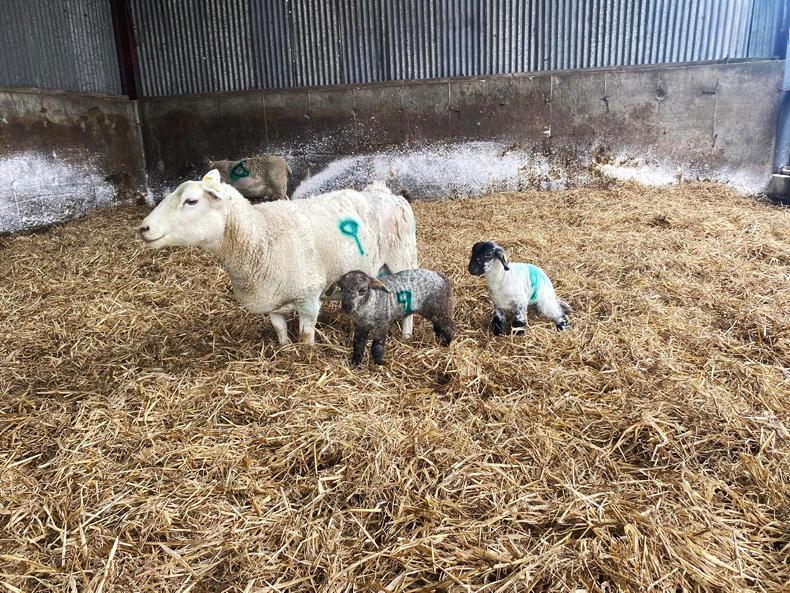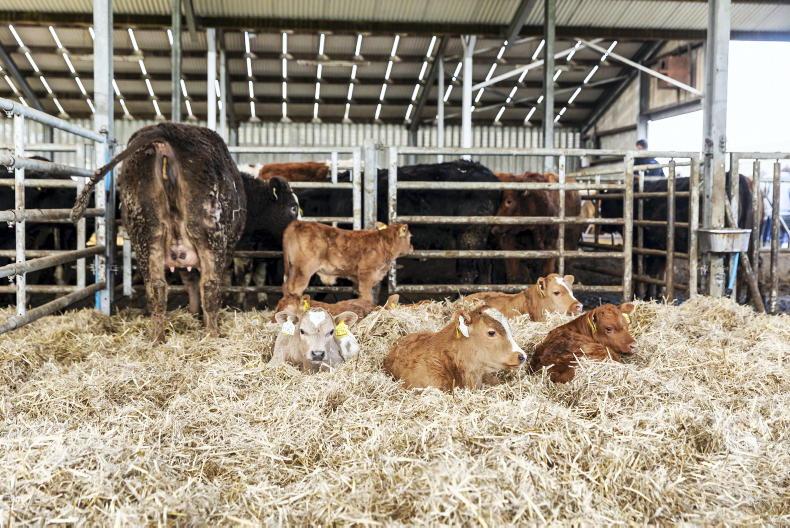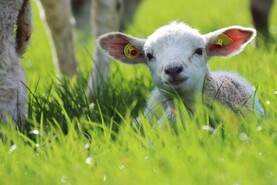This week’s torrential rainfall is dominating discussions at farm level and on Tullamore Farm the situation is no different.
Farm manager Shaun Diver reports that he had hoped to be in a position to turn out a few more cows and calves, but rainfall on Wednesday and Thursday was such that ground conditions will take some time to dry before this can be completed.
There are seven first-calf heifers and their calves at grass, along with 15 of the lightest yearling heifers.
These animals were viewed as priority animals to get to grass and are performing well, despite the inclement weather.
Calving is progressing nicely again following a lull, with 53 out of the 81 cows calved.
Retaining animals indoors is creating challenges in terms of a higher labour input in bedding cows and calves, with the stocking rate in some sheds higher than desired.
Sufficient straw is being used to keep calves comfortable, with high standards of hygiene hopefully keeping a lid on disease.
Lambing activity
Lambing is less than a week old and is gradually ramping up. There have been a few typical issues at the start of lambing, with a couple of triplet-bearing ewes lambing early and a few lambs lost.
There was a couple of lambs lost this week that Shaun did not like the look of in terms of one lamb in the litter being born small and weak and subsequently dying or stillborn.
These lambs have been submitted to the regional veterinary laboratory as a precaution.
Outside of this, Shaun says lambing is going pretty well, with ewes lambing down with plenty of colostrum and good-sized lambs exhibiting good vigour.
A close eye is being kept on ewes in lamb to the Suffolk ram, with a few ewes needing slight assistance. Ewes are being supplemented at a rate of 0.5kg for single-bearing ewes, 0.8kg for twin-bearing ewes and 1kg for triplet-bearing ewes.
Turnout
Ewes and lambs were delayed turnout midweek, but Friday provided an opportunity to get more ewes and lambs outdoors. Ground conditions are not ideal, with water lying on some paddocks, but ewes and lambs are being released in small numbers to sheltered paddocks.
Ewes will be supplemented for the first week to 10 weeks during inclement weather to help guard against grass tetany and boost milk yield.

It is the first year of the farm lambing Easycare ewes and, to date, lambing has been progressing well with these sheep.
Performance records are being collected post-lambing, with each lamb being weighed, tagged and matched to the ewe via the Sheep Ireland recording app.
Data such as ewe milk yield, mothering ability and lamb vigour, along with any issues, are being recorded.
Shaun highlights that two students - Sinéad Grenham from University College Dublin and Ryan Douglas from Gurteen Agricultural College - are a great aid in recording data and giving newborn calves and lambs the best start in life.
There were five dry ewe hoggets sold in Tullamore Mart on Wednesday. Two heavy Texel ewe hoggets weighing 70kg sold for €212 each, while two Easycare ewe hoggets and a lighter Texel-cross ewe hogget weighing 50kg on average sold for €193.
Weanling sales
A batch of 11 lighter yearling bulls were sold this week in Roscrea Mart. The bulls in question were some later-born and plainer-quality Salers bulls, along with a few Limousin-sired bulls.
The 11 bulls averaged 389kg and sold for €1,152 (€2.96/kg), with prices ranging in the main from €2.70/kg to €2.90/kg for plainer-quality types and up to €3.20/kg for the best-quality bulls.
This week’s torrential rainfall is dominating discussions at farm level and on Tullamore Farm the situation is no different.
Farm manager Shaun Diver reports that he had hoped to be in a position to turn out a few more cows and calves, but rainfall on Wednesday and Thursday was such that ground conditions will take some time to dry before this can be completed.
There are seven first-calf heifers and their calves at grass, along with 15 of the lightest yearling heifers.
These animals were viewed as priority animals to get to grass and are performing well, despite the inclement weather.
Calving is progressing nicely again following a lull, with 53 out of the 81 cows calved.
Retaining animals indoors is creating challenges in terms of a higher labour input in bedding cows and calves, with the stocking rate in some sheds higher than desired.
Sufficient straw is being used to keep calves comfortable, with high standards of hygiene hopefully keeping a lid on disease.
Lambing activity
Lambing is less than a week old and is gradually ramping up. There have been a few typical issues at the start of lambing, with a couple of triplet-bearing ewes lambing early and a few lambs lost.
There was a couple of lambs lost this week that Shaun did not like the look of in terms of one lamb in the litter being born small and weak and subsequently dying or stillborn.
These lambs have been submitted to the regional veterinary laboratory as a precaution.
Outside of this, Shaun says lambing is going pretty well, with ewes lambing down with plenty of colostrum and good-sized lambs exhibiting good vigour.
A close eye is being kept on ewes in lamb to the Suffolk ram, with a few ewes needing slight assistance. Ewes are being supplemented at a rate of 0.5kg for single-bearing ewes, 0.8kg for twin-bearing ewes and 1kg for triplet-bearing ewes.
Turnout
Ewes and lambs were delayed turnout midweek, but Friday provided an opportunity to get more ewes and lambs outdoors. Ground conditions are not ideal, with water lying on some paddocks, but ewes and lambs are being released in small numbers to sheltered paddocks.
Ewes will be supplemented for the first week to 10 weeks during inclement weather to help guard against grass tetany and boost milk yield.

It is the first year of the farm lambing Easycare ewes and, to date, lambing has been progressing well with these sheep.
Performance records are being collected post-lambing, with each lamb being weighed, tagged and matched to the ewe via the Sheep Ireland recording app.
Data such as ewe milk yield, mothering ability and lamb vigour, along with any issues, are being recorded.
Shaun highlights that two students - Sinéad Grenham from University College Dublin and Ryan Douglas from Gurteen Agricultural College - are a great aid in recording data and giving newborn calves and lambs the best start in life.
There were five dry ewe hoggets sold in Tullamore Mart on Wednesday. Two heavy Texel ewe hoggets weighing 70kg sold for €212 each, while two Easycare ewe hoggets and a lighter Texel-cross ewe hogget weighing 50kg on average sold for €193.
Weanling sales
A batch of 11 lighter yearling bulls were sold this week in Roscrea Mart. The bulls in question were some later-born and plainer-quality Salers bulls, along with a few Limousin-sired bulls.
The 11 bulls averaged 389kg and sold for €1,152 (€2.96/kg), with prices ranging in the main from €2.70/kg to €2.90/kg for plainer-quality types and up to €3.20/kg for the best-quality bulls.







 This is a subscriber-only article
This is a subscriber-only article










SHARING OPTIONS: